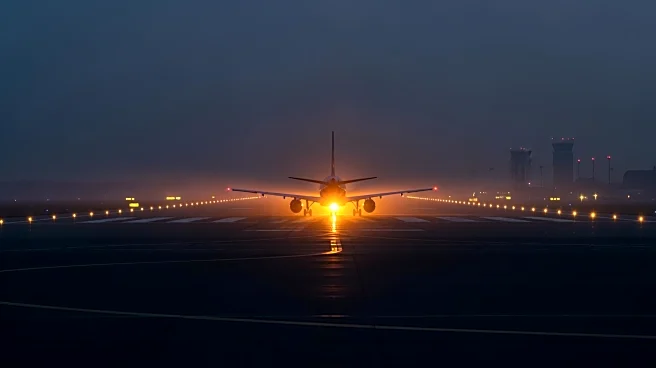What's Happening?
The National Institute of Civil Aeronautics (INAC) in Venezuela has issued a 48-hour ultimatum to international airlines, demanding the resumption of operations or facing the revocation of their permits.
This move comes amid heightened military activity and safety concerns in Venezuelan airspace, leading to several airlines suspending their flights. The International Air Transport Association (IATA) has emphasized that these suspensions are temporary measures, driven by technical safety protocols rather than political motives. The crisis began when the US Federal Aviation Administration (FAA) issued a critical safety warning for Venezuelan airspace, followed by similar actions from Spanish authorities. Major airlines such as Iberia, TAP, LATAM, Avianca, GOL, and Caribbean Airlines have suspended operations, while others like Air Europa and Plus Ultra are on the brink of suspension due to pressure from insurers and Spanish authorities.
Why It's Important?
The suspension of flights to Venezuela has significant implications for the country's connectivity and economic stability. Airlines operate under 'Hull War and Allied Perils' insurance policies, which are affected by safety warnings from entities like the FAA and European regulators. The ultimatum from INAC risks further isolating Venezuela, as airlines are unlikely to resume operations without valid insurance coverage. This situation highlights the intersection of aviation safety and political decisions, with potential financial consequences for airlines operating in the region. The presence of military forces and uncoordinated flights creates a hostile environment, reminiscent of past aviation tragedies, prompting international airlines to prioritize safety over compliance with local demands.
What's Next?
The immediate future for Venezuelan air travel remains uncertain, as airlines await improved safety conditions before resuming operations. IATA has promised that airlines will return 'as soon as conditions allow,' indicating a reliance on changes in the military and insurance landscape. The Venezuelan government may need to address the underlying safety concerns and coordinate with international bodies to restore confidence in its airspace. Meanwhile, local operators like Copa Airlines continue to maintain limited connectivity, but strategic allies like Turkish Airlines have already adjusted their operations, signaling a broader recalibration of safety margins.
Beyond the Headlines
The Venezuelan aviation crisis underscores the complex relationship between national sovereignty and international aviation standards. INAC's ultimatum reflects a political strategy that clashes with technical realities, as airlines prioritize passenger safety and insurance viability over regulatory compliance. This situation may lead to long-term shifts in how airlines assess risk in politically volatile regions, potentially influencing future insurance policies and operational decisions. The crisis also highlights the role of global insurance markets in shaping aviation operations, as coverage dynamics change in response to geopolitical tensions.










